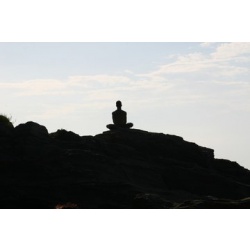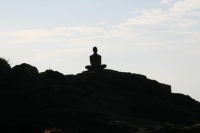
OPINION: "Ben, here's your coffee. Do you meditate?"
(by decorahnews.com's Ben Gardner):
While getting coffee recently at a local coffee shop, I was asked by a barista: "Do you meditate?" Perhaps there was something serene and contemplative about the way I ordered my coffee; more likely he was making small talk.
I chuckled, buying time as I noodled the question. "Yes," I finally said. "But I think of meditation differently than a lot of people."
I went on to say that, in my experience, there's no right or wrong way to meditate. There's a misconception that meditation is supposed to involve deep concentration, the goal of which is some degree of revelatory experience. Doesn't have to be that way.
Going for a walk can be meditation. If, during your walk, you take a few moments of time—however brief—and take a metaphorical step back and reflect on what's going on in your body and the thoughts streaming through your mind. Meditation, for me, is really about noticing. You don't need to quiet or conquer your thoughts; it's helpful simply to notice these thoughts, feelings, or sensations, and then return back to an object of focus, such as your breath or the feeling of your skin.
I'm like most everyone else: my brain isn't typically quiet and sedate; it's active—memories and delusions mix with feelings and narratives to create a very dynamic, often turbulent, mental experience. And this mental experience is typically consumed by various stories and fictions, having to do with me or people I know or resent or admire. Many, if not most, of these stories are inaccurate; and relying so heavily on these inaccurate portraits of the external world, in time, can become toxic.
For me, meditation has been a salve to these intrusive thoughts. I don't use meditation to conquer these thoughts; I use it calmly notice them, and, in noticing these thoughts, I don't obliterate them. I notice them, and then slowly begin to realize how these stories we tell ourselves are fictions.
However, spending time and energy noticing your thoughts can be uncomfortable, and, in my experience, can amplify my neurotic thoughts. As Robert Wright notes in his ambitiously titled book "Why Buddhism is True": "The very silence and seclusion that frees you from workaday concerns can also give you time to get immersed in other concerns—notably personal or family issues that in everyday life might visit you, and even revisit you, but not settle in for a long stay."
Before working at decorahnews.com, I ran a local financially unsuccessful cooperative bakery. It was an anxiety-inducing situation in many respects; and my self-care became a priority. I had to figure ways to quiet the persistent, negative, and counterproductive voices that would swarm in my mind during the long hours of prepping, mixing, kneading, and baking bread alone. I was working 65+ hour weeks, seven days a week, so I had plenty of time to ruminate on petty fictions and narratives involving jealousy, resentment, shame, judgment—the typical gamut of neurotic thoughts.
So I started meditating, but in a weird way. I'd spring awake, as if compelled by some elemental force, around 1:50 a.m. Then I'd sit on my yoga mat and listen to 10 minutes of music. No more, no less. The music would change, often forced by my mood or the seasons. I went through a Leonard Cohen phase, followed by Springsteen, then Merle Haggard and Hank Williams. Then I pivoted; I needed empowerment, but also a beat, so I went for the pop divas: Whitney, Shania Twain, Donna Summer, Cher, Ru Paul. Someone might balk at calling this meditation. Whatever, it involved concentration, awareness, breath, and it strengthened my concentration muscles for long, quiet, and arduous days of baking alone.
Meditation is about noticing these thought patterns, and in the process, dispelling the power and influence of these thoughts. In addition to dispelling unwarranted stress and anxiety, as Robert Wright notes, "being in closer-than-usual contact with the actual workings of your mind can lead you to confront issues with a new and perhaps unsettling honesty."
Site designed and maintained by Iroc Web Design Services©.
Your Small Business Web Design Solutions.™


